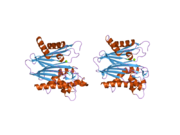
Cyclin-dependent kinase 2, also known as cell division protein kinase 2, or Cdk2, is an enzyme that in humans is encoded by the CDK2 gene. The protein encoded by this gene is a member of the cyclin-dependent kinase family of Ser/Thr protein kinases. This protein kinase is highly similar to the gene products of S. cerevisiae cdc28, and S. pombe cdc2, also known as Cdk1 in humans. It is a catalytic subunit of the cyclin-dependent kinase complex, whose activity is restricted to the G1-S phase of the cell cycle, where cells make proteins necessary for mitosis and replicate their DNA. This protein associates with and is regulated by the regulatory subunits of the complex including cyclin E or A. Cyclin E binds G1 phase Cdk2, which is required for the transition from G1 to S phase while binding with Cyclin A is required to progress through the S phase. Its activity is also regulated by phosphorylation. Multiple alternatively spliced variants and multiple transcription initiation sites of this gene have been reported. The role of this protein in G1-S transition has been recently questioned as cells lacking Cdk2 are reported to have no problem during this transition.

Cyclin-dependent kinase 4 also known as cell division protein kinase 4 is an enzyme that in humans is encoded by the CDK4 gene. CDK4 is a member of the cyclin-dependent kinase family.

Cell division protein kinase 6 (CDK6) is an enzyme encoded by the CDK6 gene. It is regulated by cyclins, more specifically by Cyclin D proteins and Cyclin-dependent kinase inhibitor proteins. The protein encoded by this gene is a member of the cyclin-dependent kinase, (CDK) family, which includes CDK4. CDK family members are highly similar to the gene products of Saccharomyces cerevisiae cdc28, and Schizosaccharomyces pombe cdc2, and are known to be important regulators of cell cycle progression in the point of regulation named R or restriction point.

Cyclin-dependent kinase 1 also known as CDK1 or cell division cycle protein 2 homolog is a highly conserved protein that functions as a serine/threonine protein kinase, and is a key player in cell cycle regulation. It has been highly studied in the budding yeast S. cerevisiae, and the fission yeast S. pombe, where it is encoded by genes cdc28 and cdc2, respectively. With its cyclin partners, Cdk1 forms complexes that phosphorylate a variety of target substrates ; phosphorylation of these proteins leads to cell cycle progression.

Mitogen-activated protein kinase 3, also known as p44MAPK and ERK1, is an enzyme that in humans is encoded by the MAPK3 gene.

Serine/threonine-protein phosphatase 2A catalytic subunit alpha isoform is an enzyme that is encoded by the PPP2CA gene.

M-phase inducer phosphatase 1 also known as dual specificity phosphatase Cdc25A is a protein that in humans is encoded by the cell division cycle 25 homolog A (CDC25A) gene.

M-phase inducer phosphatase 2 is an enzyme that in humans is encoded by the CDC25B gene.

CDK-activating kinase assembly factor MAT1 is an enzyme that in humans is encoded by the MNAT1 gene.

G1/S-specific cyclin-E1 is a protein that in humans is encoded by the CCNE1 gene.

Cell division control protein 6 homolog is a protein that in humans is encoded by the CDC6 gene.

Cyclin-A1 is a protein that in humans is encoded by the CCNA1 gene.

Alpha-actinin-1 is a protein that in humans is encoded by the ACTN1 gene.

Cyclin-dependent kinase 5 activator 1 is an enzyme that in humans is encoded by the CDK5R1 gene.

PITSLRE serine/threonine-protein kinase CDC2L1 is an enzyme that in humans is encoded by the CDC2L1 gene.

Protein phosphatase 1A is an enzyme that in humans is encoded by the PPM1A gene.

A kinase anchor protein 1, mitochondrial is an enzyme that in humans is encoded by the AKAP1 gene.

Cell division protein kinase 3 is an enzyme that in humans is encoded by the CDK3 gene.

Cyclin-dependent kinase inhibitor 3 is an enzyme that in humans is encoded by the CDKN3 gene.

CTD small phosphatase-like protein is an enzyme that in humans is encoded by the CTDSPL gene.

























